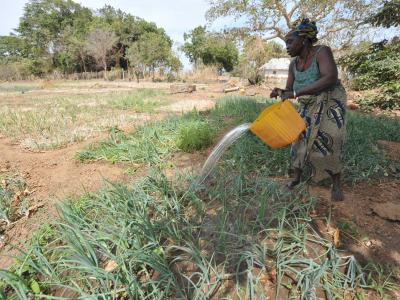Laying the foundations for climate-sensitive budgeting and expenditure tracking in The Gambia
Submitted by Louis da Costa on 26 February 2019

20-21 February 2019 – Establishing a methodology for climate-sensitive budgeting and expenditure tracking is a foundation for ensuring long-term investments in national adaptation planning. To strengthen the capacity of institutions to identify and track climate-related expenditure, the United Nations Development Programme (UNDP) and Food and Agricultural Organisation of the United Nations (FAO), through the Integrating Agriculture in National Adaptation Plans (NAP-Ag) programme, in partnership with the consultancy Acclimatise and the Government of The Gambia, held a sensitization workshop for Gambian planners, policymakers and stakeholders.
The workshop provided an overview of climate change and its impacts in The Gambia and emphasised the need to integrate adaptation in national planning and budgeting. It described the basic concepts of climate expenditure tracking and focused on three key methodologies – budgetary analyses, Climate Public Expenditures and Institutional Review (CPEIR), and Climate Budget Tagging (CBT) – to classify and track adaptation-relevant expenditure in the national budget cycle. It assessed the advantages and disadvantages of each methodology and used country-specific examples to highlight interventions and experiences related to climate expenditure reviews and budget tagging. The workshop further facilitated participatory discussions on the potential challenges and opportunities of conducting a review of adaptation-related expenditure in the Agriculture and Natural Resources (ANR) sector in the Gambia.
Mr Lamin Camara, Permanent Secretary for the Ministry of Agriculture, said that “without well-thought out planning and financing mechanisms in place, climate variability affecting agricultural productivity will stifle efforts aimed at making agriculture a business.” He added that this would be particularly detrimental for the country’s youth and women.
The workshop sessions included a plenary, group discussion and a “World Café”. Through a learning-by-doing approach, participants used existing projects that contribute to adaptation and resilience-building, simulating the application of different methodologies for collecting climate-related data to make better investment decisions. A World Café styled session provided a forum for participants to think creatively and exchange ideas on addressing some of the inherent challenges within the process.
Ms. Nessie Golokai-Gould, Deputy Resident Representative, Programme and Operations, UNDP Gambia, elaborated on the importance of giving planners and policymakers a clear understanding of these processes. “By accurately tagging climate expenditure, the government will be in a better position to make informed investment decisions, facilitate better integration of climate change into national plans and allow effective monitoring of resources allocated to climate change.”
In collaboration with a national expert on budgeting, Acclimatise will conduct a basic review of adaptation expenditure in Gambia’s ANR sector in March 2019. The review will be conducted through interviews and data collected from the Ministry of Environment, Finance and Economic Affairs, Agriculture and Natural Resources and the Department of Water Resources.